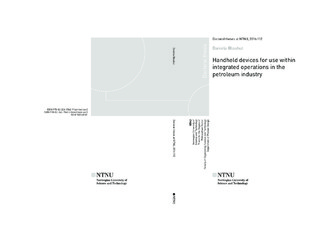| dc.description.abstract | Handheld devices have been used for several years in integrated operations in the petroleum industry. There is little knowledge of the effects of their design on efficient and safe plant operation, however. Moreover, little is known about how operators evaluate design and usability of mobile devices to support their work. The objective of this research work is to investigate how the design of handheld devices affects working routines to facilitate efficient and safe operations at gas processing plants and to what extent their use improve current procedures and satisfies users’ needs.
For the purpose of creating design criteria for future product development, the research includes the collection and analysis of data on existing collaborative work practices in safety critical environments and evaluation studies of handheld devices that are currently used by operators on Norwegian land facilities. The criteria are based on theory and interviews, observation material, and video data from three ethnographic fieldwork studies conducted at the Ormen Lange and Hammerfest LNG onshore processing plants. The data were analysed using techniques from ethnographic analysis, video analysis, and design.
The thesis seeks to show relationships by taking a holistic view of human-computer interaction (HCI). It brings interaction with the real world ʊ including sensory experience ʊ into the focus of attention when designing future products. Creative decisions, in particular for mobile communication technologies, should be based upon theoretical considerations of the life world, embodiment, and Gestalt theory as well as on frameworks such as Distributed cognition and Activity theory because they are important for correct and effective use of technical devices. Handheld devices used in industrial contexts should be designed to support task performance rather than device performance. To succeed, the focus should, on the one hand, be on physical space in which work is done and on established procedures. On the other hand, user experiences and behavioural patterns as well as users’ mobility should be taken into account. A logical outcome of this is simplification of technology complexity.
The aim of this research work is not to provide innovative technology but rather to emphasise the impacts of mobile technologies on people and business goals as well as on the physical and social environment in which technologies are used. The thesis is written from a design perspective and suggests aims for the design of handheld devices for use in the oil and gas industry. It presents a complex theoretical and empirical research and shows the dimensions that must be considered when designing seemingly small devices in order to meet their requirements. To answer the problem statement of the thesis, material from the fields of philosophy, cognitive science, and design theory was used and related to the empirical data collected from fieldwork studies. Based on a comprehensive design and context analysis, knowledge about handheld devices used in a hazardous work setting and information about user experiences is presented and data on the activity system of field operators provided.
Finally, design criteria for handheld devices are suggested and three concepts of mobile devices evaluated to identify their opportunities and challenges.
The research results show why it is necessary to design mobile technology from a user’s perspective. There is, however, a need for more empirical research in time-constrained, data-driven environments where people are required to perceive data rapidly in fast-paced situations. In order to provide people with well-designed equipment, human aspects will have to play a greater role in technology development and in design and engineering sciences. | nb_NO |
